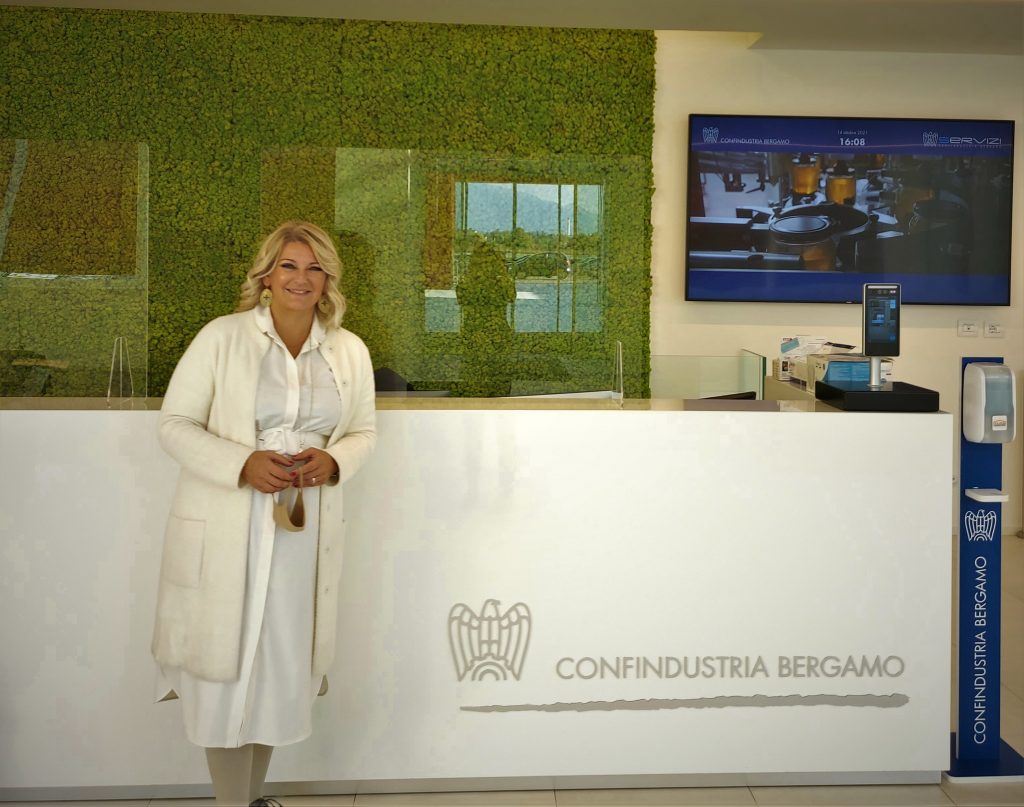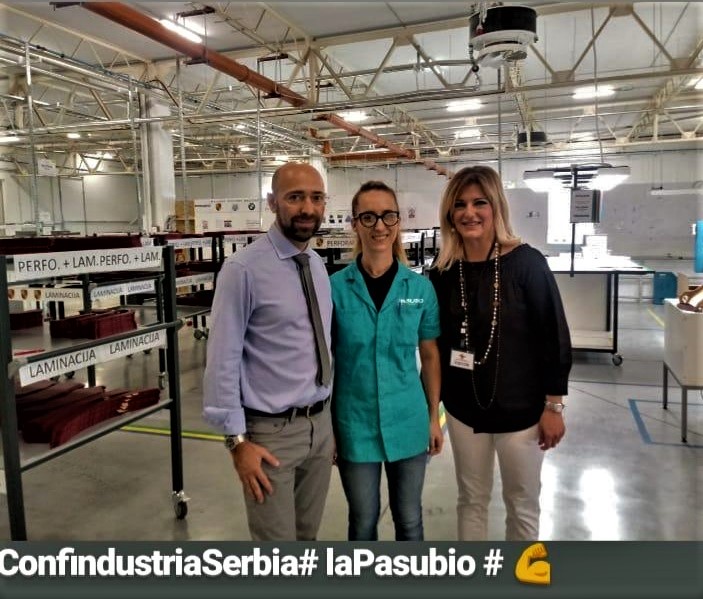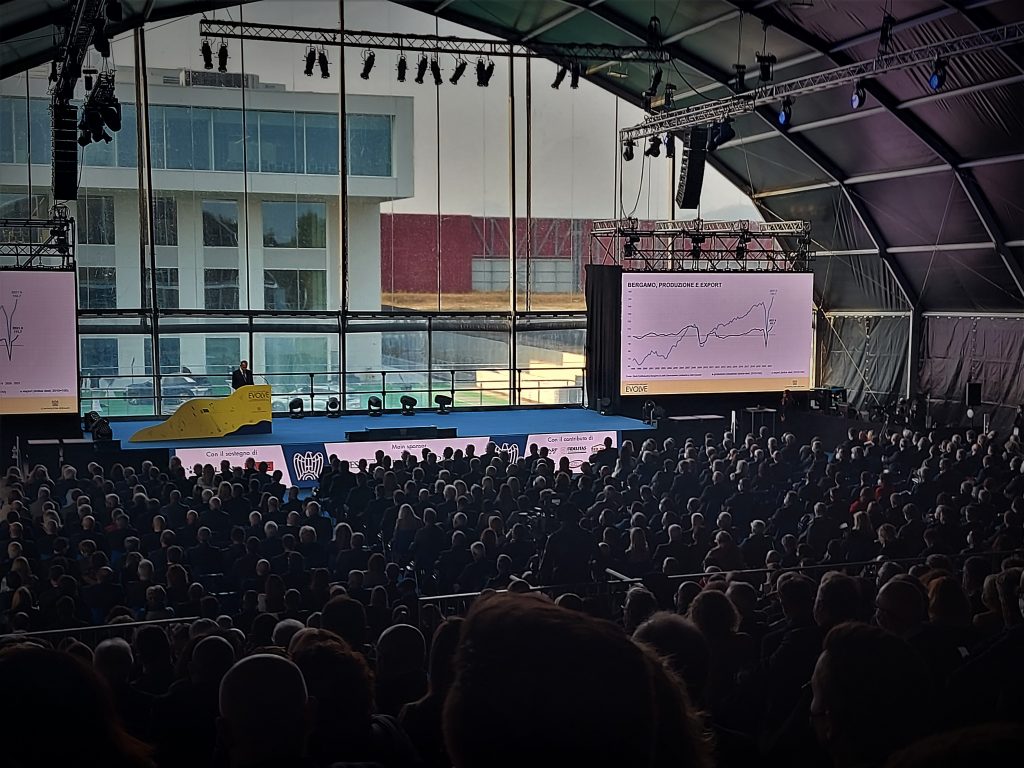Confindustria Serbia’s initiatives are well-intentioned; we are always open for dialogue and partnership with Serbian institutions, especially on the Green Agenda’s focus, one of the strongest challenges in the EU and the global economy. We believe that Serbia will also accelerate projects on this topic.
“The economy is showing healthy signs of recovery. Italy is currently recording 6% economic growth. It is important to maintain open dialogue with institutions because it should contribute not just to ensure growth but also guarantee continuity of economic growth. This dialogue is currently being conducted at the government and business level in Italy, but also with the largest European economies in Italy, France and Germany. The focus is on the topics related to the great transformation envisaged by the EU’s digital and green agenda,” says Irena Brajović, Director of Confindustria Serbia.

How much did the Covid-induced crisis in Italy affect companies in Serbia?
If we follow the logic of implemented investments in Serbia, via the mother-daughter company format, our members in Serbia have experienced serious disturbances in their business results in terms of the projected production and sales goals. In the first two quarters of 2020, these dropped from 30 to 60 percent in some industrial branches, such as textile and footwear production, and some segments of the automotive industry. Fortunately, industries like pharmaceutical, food, ICT or luxury segment of the automotive industry have ended their business year with very good results.
One of the more important challenges, common to all our companies in that period, was preserving jobs and implementing precautionary and supervision measures related to the complications regarding the health situation in the country and its direct consequences for the organization of production. We must underline that a huge effort has been made by our companies on resolving both issues. Therefore, if I had to assess the period behind us, I can say that we have learned that only good and timely coordination between the health care and manufacturing sectors, as well as the timely adoption of clear and binding procedures, can provide effective support in preventing problems.
As a result of companies investing a lot of effort and the Serbian government providing their strong support through economic assistance measures for companies, we have managed to record quite good business results and have started to recover in 2021, as well as having a moderate number of workers losing their jobs. All this guarantees that our companies, even in such challenging times, are determined to stay, stabilize their business and continue with further investments in Serbia.
What were the biggest problems of Italian companies in the previous period as well as this year, considering that the crisis is still ongoing and that the flow of people is still limited?
Italy’s economy is showing healthy signs of recovery, with Italy currently recording a 6% economic growth, even though the effects of this global recession caused by the pandemic are still strong and that most economies in developed countries are not showing signs of rapid economic recovery. At the onset of the pandemic, Italy was the worst situation out of all European countries in terms of the number of infected and, unfortunately, in terms of the number of people who died. At that time, it recorded a serious GDP decline of 8.8% which lasted until the end of 2020, with a similar trend showing by the end of the first quarter of 2021. This period was marked by blocked social and economic flows in Italy, but also by major problems in Italy’s foreign trade and export. Furthermore, in 2021, the interrupted or hindered supply from the Far East countries did not recover quickly, and they were accompanied by the increase in production costs, as well as a large drop in consumption. As a result, many capillary industries, that operate in line with the Italian export model, suffered large losses in supplying export markets.
It is important to maintain open dialogue with institutions because it should contribute not just to ensure growth but also guarantee continuity of economic growth
As we sometimes say in the spirit of preserving optimism and solutions – hoping that at least someone is doing alright when times are difficult for others. In this situation, it turned out that Serbia proved to be one of the good solutions to these problems. Numerous benefits that Serbia has – from geographical proximity and convenience of transport connections which are important for transport and logistics, proximity to suppliers and prestigious markets – today we can talk about the intensification of interests and needs of Italian industry to upgrade existing and seek new partners in Serbia, thus ensuring additional competitiveness in the international market.
If measures aimed at stopping and controlling the spread of Covid soon yield the expected results and thus contribute to accelerating the simplification of procedures relating to the movement of people, I believe that we will see a further intensification of economic and economic ties between Italy and Serbia. I am confident that we can also talk about the perspective of opening new sectors of cooperation, related to the topics of the EU’s digital and green agenda and the transformation of industry and services in a wider geographical scope.

Were there any delays in the started investments in Serbia, and is this year better than the previous one in that respect?
Companies have partially slowed down plans for new investments or expansion of existing ones, but have not stopped. We have recently had the pleasure of celebrating and publicly marking a few new investments. Less than a month ago, our member Gruppo SIAD / Istrabenz Plini officially opened a state-of-the-art industrial gas filling station, worth 16 million euros and the company continues to implement further development plans. They are not alone in this, hence I would like to mention a few more Italian companies that have made investments, such as Pasubio Spa, Martini Gradnja, Becchis Osiride, Moretto Group and others.
The last quarter of 2021 marked a large increase in inquiries from Italian companies in terms of industrial partnerships and demand for suppliers in Serbia. It is obvious that domestic companies have a good image in terms of capacity and know-how, while the challenges mainly relate to the modernity of technological processes, limitations of existing equipment and certain specialized training.
We must keep in mind, however, that we are in a very delicate phase in which never before in history has the value of competencies in the light of competitiveness been such a central topic in our economies. There is a real talent risk going on in the world, with industrial forces competing in training and attracting workforce and talent, capable of managing changes in the current industrial transformation. Leading business people and the management of our parent association are working exhaustively with the representatives of the Italian government on new solutions because Italy cannot and must not lag in that sense. Therefore, schools with high technological specialization represent not only hope but also a definite possibility for the overall growth of the system. This is a medium-term vision that guarantees employability to new generations. We believe that Serbia is a strong partner on this path thanks to its new dual education system and modernization of school curricula.

You encourage highlighting the importance of various areas such as human resources, energy, e-commerce, etc. What will be the focus next year?
We are consistent when it comes to these topics because we believe that much more needs to be done. Europe has revised its agenda which is now ambitious, focused and development-oriented. Of course, we expect that Serbia, on its road to EU membership, will also expedite the implementation of certain activities and projects in the green energy sector and environmental protection projects, as well as support participants in the circular economy. At the EU level, Italy is a leader in the results of the circular economy and can be an excellent technological partner to Serbia. Of course, this is not easy to achieve, but there has to be a balance between what the costs that businesses need to bear in some way regarding the digital and green transformation.
I would like to use this opportunity to announce a regional conference that will take place in February next year, where there will be a dialogue between the EU and the region’s representative participants, institutions and business people on the aforementioned topics and current trends. They will also try to find answers to questions relating to disturbances in the gas and electricity market and RES perspectives. Our colleagues from Confindustria and the SEE region will help us with organization, as well as domestic partners.
Also, we will continue developing the latest and as of a few days ago, officially launched the project of cooperation in the field of e-commerce with the Shoppster Company. Believing that such a state-of-the-art and current commerce format must be encouraged to the extent that it is possible to build and gain the trust of consumers and vendors, we will work to increase the supply of Made in Italy products in Serbia.
What will be the biggest challenges for you as an organization in the coming months?
I would say that challenges and our mission go hand in hand. We hope that next year we will be able to work in full capacity and fully commit to projects that are in our hearts which are the result of analysis of business opportunities for cooperation between the two countries. We hope that we will not be further hindered by the pandemic-related restrictions. We believe and work on further expansion of our association according to a recognizable operational format which implies high professional dedication and enthusiasm, quality service and reliable partnership in working with our members and other stakeholders.
We could learn from the experience of other countries
We hope that health problems that are a consequence of this pandemic will start to decline. Our message is to believe in science, institutions and health care organizations. When we are healthy, we can work and face all the problems we encounter which are not always easy to overcome. As Italy has managed to overcome and learn from the situation where it had a large number of patients and deaths, we are sending out a well-intentioned message that others do not have to go through the same difficult moments, but rather learn from the experiences of other countries like Italy, which is moving forward with the maturity and responsibility of its administration and the majority of citizens.